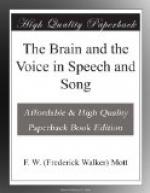A perfect psychic mechanism is as necessary as the physiological mechanism for the production of perfect vocalisation, especially for dramatic singing. A person, on the one hand, may be endowed with a grand vocal organ, but be a failure as a singer on account of incorrect intonation, of uncertain rhythm or imperfect diction; on the other hand, a person only endowed with a comparatively poor vocal instrument, but knowing how to use it to the best advantage, is able to charm his audience; incapable of vigorous sound production, he makes up for lack of power by correct phrasing and emotional expression. We see then that the combination of a perfect physiological and psychological mechanism is essential for successful dramatic singing, the chief attributes of which are: (1) Control of the breath, adequate volume, sustaining power, equality in the force of expulsion of air to avoid an unpleasant vibrato, and capability of producing and sustaining loud or soft tones throughout the register. (2) Compass or range of voice of not less than two octaves with adequate control by mental perception of the sounds of the necessary variation in tension of the laryngeal muscles for correct intonation. (3) Rich quality or timbre, due partly to the construction of the resonator, but in great measure to its proper use under the control of the will. Something is lacking in a performance, however perfect the vocalisation as regards intonation and quality, if it fails to arouse enthusiasm or to stir up the feelings of an audience by the expression of passion or sentiment through the mentality of the singer.




